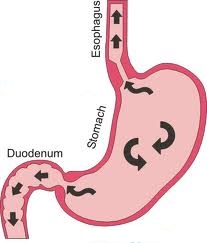What may be causing stomach discomfort, heartburn and acidity
The two main underlying causes of stomach pain, heartburn and acidity
Many of the digestive conditions that I see in my clinic can often be put down to two main contributing factors, both of which can be corrected relatively easily with herbs and dietary changes.
Overeating

Many cases of digestive complaints are caused by over eating. Over eating can stress the digestive system and causes a feeling of fullness. This usually disappears within a couple of hours as the digestive system corrects itself. If you have eaten a large meal, peppermint or ginger tea can be beneficial to help relieve these symptoms.
Low Stomach Acid Levels
The same digestive symptoms can also be caused by a lack of hydrochloric acid (HCL) in the stomach. In this case it doesn’t matter whether you eat a small meal, or a large one, the symptoms are likely to occur no matter how much you eat.
HCL stimulates the production of the digestive enzyme, pepsin, in the stomach; which helps to further breakdown food. Hence, there is a knock on effect within the digestive system due to low of stomach acid.
Poor diet can also contribute to a lack of stomach acid, as can the natural ageing process – people tend to produce less stomach acid starting around middle age.
Dietary changes can be extremely beneficial to help with symptoms caused by a lack of stomach acid.
Antacids: not the best solution
Although antacids can inhibit stomach acid and relieve the symptoms of discomfort, this may be done at the expense of more serious problems occurring. When antacids are used to suppress the production of HCL and the enzymes necessary for proper digestion, the stomach is then faced with a dilemma. What does it then do with the partially digested food when you have suppressed the HCL and enzymes with antacids?
 In this situation the stomach tends to relax the pyloric syhincter at the end of the stomach, allowing food to move to the next stage of the digestive tract; not completely digested. The presence of insufficiently digested food in the small intestine can cause intestinal gas and bloating. In addition, the absorption of insufficiently digested food in the small intestine can cause allergies and food intolerances in susceptible people. Over time the body may become so sensitive that allergic reactions can result.
In this situation the stomach tends to relax the pyloric syhincter at the end of the stomach, allowing food to move to the next stage of the digestive tract; not completely digested. The presence of insufficiently digested food in the small intestine can cause intestinal gas and bloating. In addition, the absorption of insufficiently digested food in the small intestine can cause allergies and food intolerances in susceptible people. Over time the body may become so sensitive that allergic reactions can result.
The next time you experience digestive difficulties, instead of taking antacids, consider changing your diet and for simple digestive problems, adding ginger or peppermint tea in to your regime in order to avoid these more serious problems in future.
Like this article?
Sign up to my mailing list below to receive future articles on similar topics:
